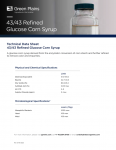Concerns raised over folic acid in bread
In an open letter to the Australian Food Industry made public on FoodWeek today, Mark Laucke of Laucke Flour said that Australia must heed increasing international concern for mandatory fortification of flour with folic acid (MFF).
On 13 September 2009 it became compulsory in Australia for all bread-making flour to be fortified with folic acid as a consequence of an amendment to the Food Standards Code.
MFF restricts consumer freedom of choice, continued Laucke, as consumers are practically unable to avoid folic acid, and he added that fortification still does not provide enough folate for the target population.
An overwhelming body of evidence links folate deficiency in early pregnancy to increased risk of neural tube defects (NTDs) - most commonly spina bifida and anencephaly - in infants.
This connection led to the 1998 introduction of public health measures in the US and Canada, where all grain products are fortified with folic acid - the synthetic, bioavailable form of folate.
Preliminary evidence indicates that the measure is having an effect with a reported 15 to 50 per cent reduction in NTD incidence. A total of 51 countries now have some degree of mandatory fortification of flour with folic acid.
Mandatory fortification of wheat flour or bread is currently under review in the UK but has not been endorsed in Sweden or Italy, and while fortification has been recommended in Ireland its implementation has been deferred.
Opponents of folic acid fortification claim epidemiological evidence suggests a slight increase in colorectal cancer rates following the introduction of fortification. Such associations have been noted in the US, Canada, and Chile.
Bread is seen as an appropriate vehicle for fortification because it is consumed across a wide cross-section of the population. Consultations with the bakery industry have indicated that the preferred point of fortification would be at the milling stage (with the exception of wholemeal flour), rather than at the bread-making stage.
This is because there is already a requirement in place to fortify milled flour with iron, calcium, thiamine and niacine, so the new requirement would build on existing technology and regulation.
But UK bakers have voiced the concern that if folic acid fortification becomes mandatory, a large slice of the population may no longer choose to purchase their products.










